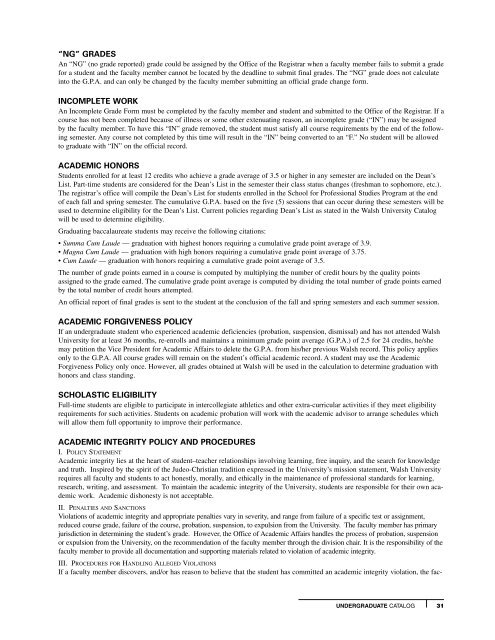Undergraduate Catalog 2006-07 - DRC Home - Walsh University
Undergraduate Catalog 2006-07 - DRC Home - Walsh University
Undergraduate Catalog 2006-07 - DRC Home - Walsh University
You also want an ePaper? Increase the reach of your titles
YUMPU automatically turns print PDFs into web optimized ePapers that Google loves.
“NG” GRADES<br />
An “NG” (no grade reported) grade could be assigned by the Office of the Registrar when a faculty member fails to submit a grade<br />
for a student and the faculty member cannot be located by the deadline to submit final grades. The “NG” grade does not calculate<br />
into the G.P.A. and can only be changed by the faculty member submitting an official grade change form.<br />
INCOMPLETE WORK<br />
An Incomplete Grade Form must be completed by the faculty member and student and submitted to the Office of the Registrar. If a<br />
course has not been completed because of illness or some other extenuating reason, an incomplete grade (“IN”) may be assigned<br />
by the faculty member. To have this “IN” grade removed, the student must satisfy all course requirements by the end of the following<br />
semester. Any course not completed by this time will result in the “IN” being converted to an “F.” No student will be allowed<br />
to graduate with “IN” on the official record.<br />
ACADEMIC HONORS<br />
Students enrolled for at least 12 credits who achieve a grade average of 3.5 or higher in any semester are included on the Dean’s<br />
List. Part-time students are considered for the Dean’s List in the semester their class status changes (freshman to sophomore, etc.).<br />
The registrar’s office will compile the Dean’s List for students enrolled in the School for Professional Studies Program at the end<br />
of each fall and spring semester. The cumulative G.P.A. based on the five (5) sessions that can occur during these semesters will be<br />
used to determine eligibility for the Dean’s List. Current policies regarding Dean’s List as stated in the <strong>Walsh</strong> <strong>University</strong> <strong>Catalog</strong><br />
will be used to determine eligibility.<br />
Graduating baccalaureate students may receive the following citations:<br />
• Summa Cum Laude — graduation with highest honors requiring a cumulative grade point average of 3.9.<br />
• Magna Cum Laude — graduation with high honors requiring a cumulative grade point average of 3.75.<br />
• Cum Laude — graduation with honors requiring a cumulative grade point average of 3.5.<br />
The number of grade points earned in a course is computed by multiplying the number of credit hours by the quality points<br />
assigned to the grade earned. The cumulative grade point average is computed by dividing the total number of grade points earned<br />
by the total number of credit hours attempted.<br />
An official report of final grades is sent to the student at the conclusion of the fall and spring semesters and each summer session.<br />
ACADEMIC FORGIVENESS POLICY<br />
If an undergraduate student who experienced academic deficiencies (probation, suspension, dismissal) and has not attended <strong>Walsh</strong><br />
<strong>University</strong> for at least 36 months, re-enrolls and maintains a minimum grade point average (G.P.A.) of 2.5 for 24 credits, he/she<br />
may petition the Vice President for Academic Affairs to delete the G.P.A. from his/her previous <strong>Walsh</strong> record. This policy applies<br />
only to the G.P.A. All course grades will remain on the student’s official academic record. A student may use the Academic<br />
Forgiveness Policy only once. However, all grades obtained at <strong>Walsh</strong> will be used in the calculation to determine graduation with<br />
honors and class standing.<br />
SCHOLASTIC ELIGIBILITY<br />
Full-time students are eligible to participate in intercollegiate athletics and other extra-curricular activities if they meet eligibility<br />
requirements for such activities. Students on academic probation will work with the academic advisor to arrange schedules which<br />
will allow them full opportunity to improve their performance.<br />
ACADEMIC INTEGRITY POLICY AND PROCEDURES<br />
I. POLICY STATEMENT<br />
Academic integrity lies at the heart of student–teacher relationships involving learning, free inquiry, and the search for knowledge<br />
and truth. Inspired by the spirit of the Judeo-Christian tradition expressed in the <strong>University</strong>’s mission statement, <strong>Walsh</strong> <strong>University</strong><br />
requires all faculty and students to act honestly, morally, and ethically in the maintenance of professional standards for learning,<br />
research, writing, and assessment. To maintain the academic integrity of the <strong>University</strong>, students are responsible for their own academic<br />
work. Academic dishonesty is not acceptable.<br />
II. PENALTIES AND SANCTIONS<br />
Violations of academic integrity and appropriate penalties vary in severity, and range from failure of a specific test or assignment,<br />
reduced course grade, failure of the course, probation, suspension, to expulsion from the <strong>University</strong>. The faculty member has primary<br />
jurisdiction in determining the student’s grade. However, the Office of Academic Affairs handles the process of probation, suspension<br />
or expulsion from the <strong>University</strong>, on the recommendation of the faculty member through the division chair. It is the responsibility of the<br />
faculty member to provide all documentation and supporting materials related to violation of academic integrity.<br />
III. PROCEDURES FOR HANDLING ALLEGED VIOLATIONS<br />
If a faculty member discovers, and/or has reason to believe that the student has committed an academic integrity violation, the fac-<br />
UNDERGRADUATE CATALOG 31



